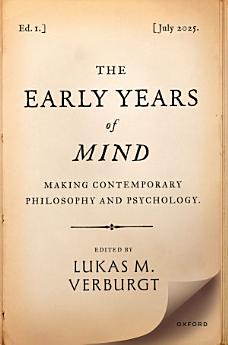The Early Years of Mind: Making Contemporary Philosophy and Psychology
May 2025 · Oxford University Press
Ebook
432
Pages
family_home
Eligible
info
reportRatings and reviews aren’t verified Learn More
About this ebook
The Early Years of Mind offers a panoramic overview as well as in-depth accounts of the first decades of Mind - one of the leading philosophical journals since almost 150 years. Founded in 1876 by Alexander Bain, it soon published some of the best new work in Anglophone philosophy and psychology, containing contributions from major and once well-known but today largely forgotten authors, from Herbert Spencer to Bertrand Russell and from J.M.E. McTaggart to E.E. Constance Jones. Mind's ambition was to provide a platform for study and discussion of the scientific status of philosophy and psychology, whose intellectual and professional standing and boundaries were yet unsettled. A focus on the contents of Mind in the first forty years of its existence not only helps unearth a revealing historical picture of the major topics, themes and traditions that dominated philosophy at the turn of the nineteenth century, including evolutionary thinking and the rise of idealist and analytic philosophers. It also makes it possible to recognize their relevance to present-day endeavours. Mind's contributors addressed issues that still (or, sometimes: again) concern us today: What is the relation between philosophy and psychology? Should philosophers be knowledgeable of the latest scientific advances, and if so, how? What is the significance of philosophy for the natural and exact sciences? And what for society? Last but not least, a close look at Mind under George Croom Robertson and G.F. Stout offers a forceful reminder of the prominent role of women philosophers in Britain and America, participating in philosophical and psychological discussion despite numerous constraints. Bringing together a diverse team of eminent and emergent scholars, this pioneering volume tells the fascinating story of Mind's early years and, in so doing, sheds light on larger questions about the history of philosophy and psychology at a time of disciplinary self-experimentation.
About the author
Lukas M. Verburgt is currently an independent scholar based in the Netherlands. He has held visiting research positions at Trinity College, Cambridge; the Department for the History and Philosophy of Science in Cambridge; and the Max Planck Institute for the History of Science in Berlin. Verburgt's research concerns the history of science, the history of philosophy, and the history of the philosophy of science in the long nineteenth century, especially in the Anglophone world. He is the author of numerous articles and (co-)editor of the Cambridge Companion to John Herschel and Aristotle's Syllogism and the Creation of Modern Logic.
Rate this ebook
Tell us what you think.
Reading information
Smartphones and tablets
Install the Google Play Books app for Android and iPad/iPhone. It syncs automatically with your account and allows you to read online or offline wherever you are.
Laptops and computers
You can listen to audiobooks purchased on Google Play using your computer's web browser.
eReaders and other devices
To read on e-ink devices like Kobo eReaders, you'll need to download a file and transfer it to your device. Follow the detailed Help Center instructions to transfer the files to supported eReaders.




